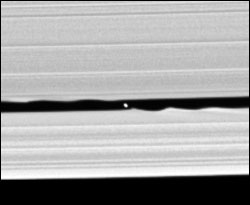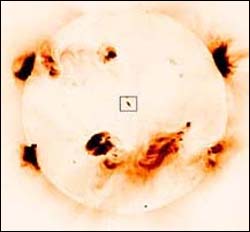
The NASA/ESA/ASI Cassini spacecraft has confirmed earlier suspicions of an unseen moon hidden in a gap in Saturn’s outer A ring. A new image shows the new moon and the waves it raises in the surrounding ring material.
The moon, provisionally named S/2005 S1, was first seen in a time-lapse sequence of images taken on 1 May 2005, as Cassini began its climb to higher inclinations in orbit around Saturn. A day later, an even closer view was obtained, which allowed the moon’
Public authorities have long needed the equivalent of the enterprise management system – as used by leading companies around the world – but seldom had the resources to afford it. Now a new collaborative-working platform developed under the ICTE-PAN project may hold the solution.
Starting in the mid-1990s, public authorities began making significant investments into IT infrastructures capable of supporting their need to manage large amounts of relatively unstructured data. Howe
Medical researchers are using satellites to track massive dust storms blowing across Africa’s Sahel belt. The aim is to learn more about lethal meningitis epidemics that often follow in the dust’s wake.
“Meningitis outbreaks take place after a period without rain, low humidity and lots of dust in the air,” explained Isabelle Jeanne of the Niger-based Centre de Recherche Médicale et Sanitaire (CERMES), associated with the international network des Instituts Pasteur and a
In a spectacular kick-off to its first season of prime ring viewing, which began last month, the Cassini spacecraft has confirmed earlier suspicions of an unseen moon hidden in a gap in Saturn’s outer A ring. A new image and movie show the new moon and the waves it raises in the surrounding ring material.
The moon, provisionally named S/2005 S1, was first seen in a time-lapse sequence of images taken on May 1, 2005, as Cassini began its climb to higher inclinations in orbit ar

Solar physicists have observed the smallest ever coronal mass ejection (CME) – a type of explosion where plasma from the Sun is thrown out into space, sometimes striking the Earth and damaging orbiting satellites. The observation has come as a great surprise to scientists and has turned previous ideas up-side-down.
To date studies of these phenomena have focussed on large explosions which are easier to detect and which have massive footprints on the Sun, sometimes covering thousan
Researchers at Wake Forest University Baptist Medical Center have found promising new molecular targets and treatment approaches for some of the most malignant brain tumors.
Results of three separate studies were presented at the World Federation of NeuroOncology meeting and the European Association for NeuroOncology meeting, both in Edinburgh, Scotland, on May 6 and 7. The research involved glioblastoma multiforme, the most common form of brain tumor and the least curable of